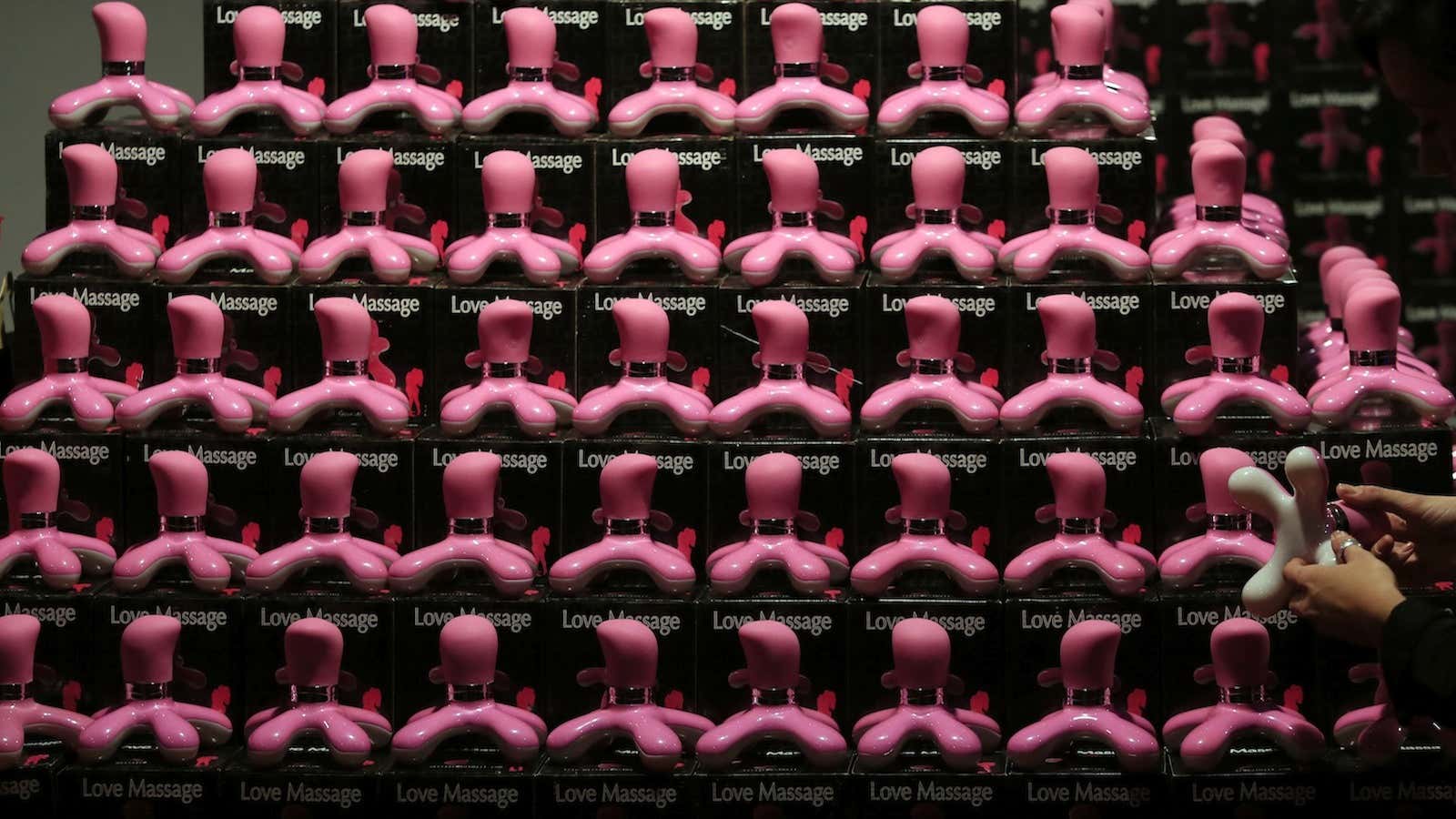In the latest war against Indian sex toys—yes, that’s a thing—Delhi lawyer Suhaas Joshi took online retailer Snapdeal to court for selling sex accessories that he says violate several laws. The case has highlighted how marketers are finding legal loopholes to satisfy consumers’ insatiable lust for sex toys.
Joshi’s main focus is India’s anti-homosexuality law, Section 377. But most sex toy crackdowns uphold the century-old Section 292 of the Indian Penal Code, which says any book, drawing, figure or object “shall be deemed to be obscene” if it fuels lascivious, or overtly sexual, thoughts and behaviour, and Section 67 of the IT Act duplicates this law for the internet.
The laws, however, can’t seem to be able to control India’s appetite for such things. More couples than ever are opening up about sex and trying out new toys in the bedroom. And the burgeoning online sex-toy market is there to help them out. Some estimate that India’s online sexual wellness industry will be worth Rs8,700 crore ($1.4 billion) by 2020, a massive increase from about Rs1,000 crore ($161 million) in 2014.
“Sexual wellness is a growing category,” said a spokesperson at Flipkart, India’s largest e-commerce website. She said the privacy factor, including the way they ship and package the products, is one reason customers are drawn to their discreet world of online shopping.
Skirting the law
Like Amazon and other big retailers, Flipkart plays it safe. It offers products such as vibrators, dildos and flavoured lubricants under labels like “health and personal care,”so that they don’t scream sex so much as whisper it in lovers’ ears. Other sites are more upfront. Masala Toys offers blow-up sex dolls with realistic hair placement, and colourful vaginal beads.
Many of these products are only legal—or illegal—depending on how they are displayed, shaped and sold, said Vaibhav Parikh, a partner at international law firm, Nishith Desai Associates. “Some products fall into the grey area and depend on circumstances—a massager is legal, but one that is shaped like a private part is considered to be illegal,” he said.
In the Snapdeal case, Joshi, a Supreme Court advocate, said he wanted to test the anti-homosexuality law on the company’s collection of anal lubricants, dildos and vibrators. Snapdeal, which connects vendors and buyers, said it takes down listings if they are reported as inappropriate.
When courts decide on whether a sex toy is legal or illegal, Parikh explained, they are usually trying to figure out whether the way a product was advertised made people act and buy it with a “depraved mindset.”
But that fear of depraved, sexualised behaviour is why other people argue that sex toys should exist. Ira Trivedi, author of India in Love, a book about India’s complicated sexual revolution, said many doctors and sexologists prescribe sex toys as a healthy outlet, especially for single men.
Toying with depravity
In her book, Trivedi cites that the government has cracked down on vendors for smuggling sex toys and lingerie. And she found that online sex-toy websites hire teams of lawyers before they set up shop.
“Yes there is censorship, yes it’s under the radar, but people are trying to get around that,” Trivedi said.
Customers also try to circumvent these restrictions to get what they desire. Quartz spoke to a Mumbai-based marketing professional—who chose to remain anonymous—who has gathered a collection of sex toys from across the world, spending as much as $200 for a glass dildo.
She has had little luck buying sex toys in the Indian market since the quality and variety is limited in the hush-hush black market atmosphere. Products seem overpriced online. And shopping otherwise requires knowing exactly where to go and who to buy from in markets such as Delhi’s Karol Bagh.
Even so, she thinks India’s young and sexually active society doesn’t shy away from the products because of the law. “That legal factor doesn’t play on anyone’s mind,” she said. “Women are no longer shy to talk about sex and things of pleasure.”
However open the public mindset on topics of sex and erotic play might be, Parikh said the laws are here to stay, and that any company selling things in India will be expected to get on board.
Looks like those handcuffs might come to plenty of use.
We welcome your comments at ideas.india@qz.com.
